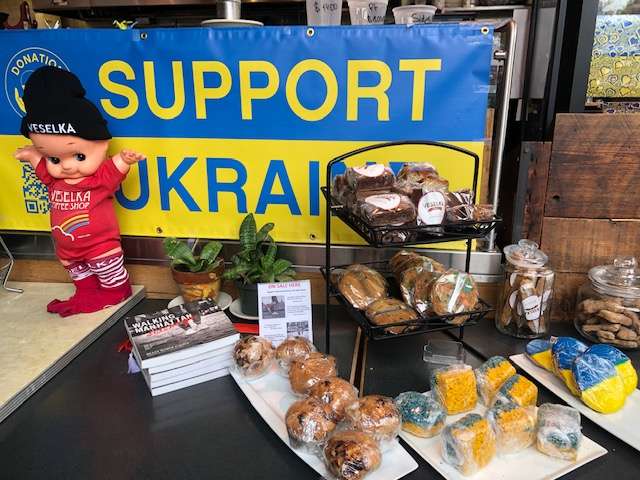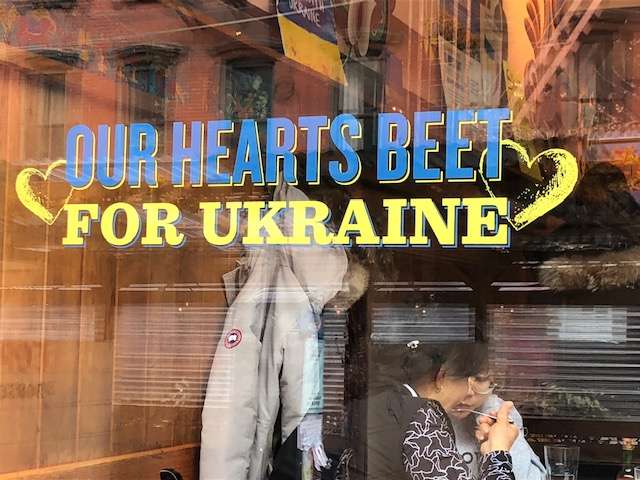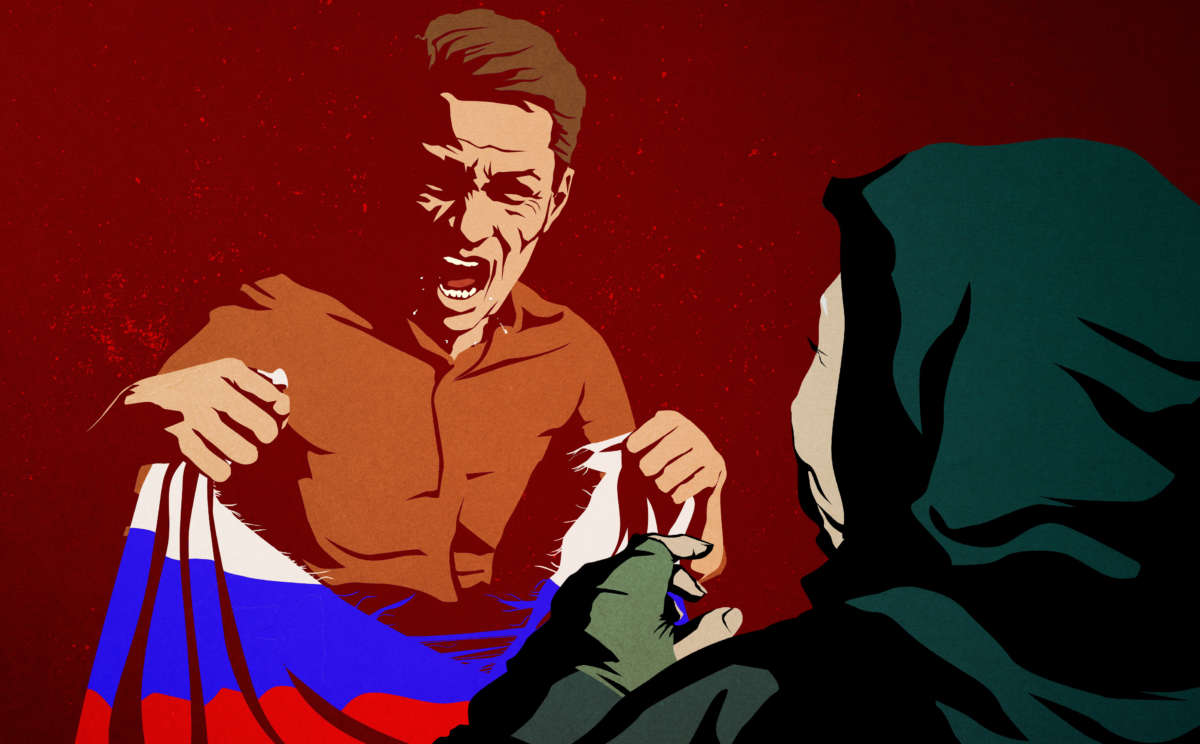Part of the Series
Russia's War on Ukraine in an Age of Escalating Imperial Tensions
On a warm Thursday in March, Firouza, an immigrant from Uzbekistan, is sitting in front of her shop in Brooklyn’s Little Odessa, a section of Brighton Beach. It’s home to more than 35,000 people, many of them born in the eastern European countries that once comprised the Soviet Union.
Firouza is methodically cutting pieces of blue and yellow ribbon while sitting on a chair in the store’s entryway. After she amasses a small pile, she ties the strips into a bow and adds a safety pin. A dollar buys one and business is brisk as diverse customers stop by to purchase this small token of solidarity with their Ukrainian neighbors.
Firouza also sells Ukrainian flags and the multicolored flowered shawls and scarves that are popular in Ukraine.
She has been doing this, she says, since the third day of Vladimir Putin’s war.
“I don’t know anyone in Ukraine and have never been there,” she tells Truthout. “But the war made me depressed. Everyone in this neighborhood is stressed out. We can’t sleep. Children and women are dying. Bombs are falling. I had to do something to raise money to help.”
Firouza is not the only local business owner to express this sentiment. In fact, dozens of restaurants and stores along Brighton Beach Avenue, the community’s commercial strip, are flying the blue and yellow flag of Ukraine and many windows bear messages calling for peace that are written in the Cyrillic alphabet. A few shops are also collecting money and supplies for shipment abroad, including antibacterial wipes, aspirin, bandages, batteries, diapers, headlamps, Ibuprofen, ready-to-eat packaged food and meal bars, tape, tourniquets, underwear, socks, T-shirts and hats.
Shopkeeper after shopkeeper reports that such expressions of solidarity are happening throughout the U.S., wherever large concentrations of Ukrainians live or have ties.
Manhattan’s East Village, for example, once boasted a large Ukrainian population, and while gentrification has pushed out most of those who came here in the 1970s, ‘80s and ‘90s, several Ukrainian businesses, a credit union and two Ukrainian churches are still located in the area. Signs with the words “Slava Ukraini” — Glory to Ukraine — appear in many shop windows. Lampposts on every corner of busy Second Avenue are covered in anti-Putin posters, ads for an April 16th “Comics for Ukraine” fundraiser, and pictures of Ukrainian president Volodymyr Zelenskyy. Colorful posters on doors urge residents to donate goods and money to ongoing relief efforts.
Veselka Restaurant, the oldest Ukrainian business in the borough, raised $250,000 during the first two weeks of the war and is donating 100 percent of its borscht sales to refugee aid.
Jason Birchard, the third-generation owner of the eatery, told Truthout that the outpouring of support has been tremendous. “Most people recognize that Ukrainians are being mistreated, and when they see the atrocities on the news night after night, they want to do something to show their outrage and support the people who are being driven from their homes.” The restaurant has partnered with St. George Ukrainian Catholic Church, Birchard says, and materials and money are being sent to Poland. From there, he explains, resources are going to established social welfare organizations and pop-up sites that are providing immediate assistance to the people coming into the country.
“We will do this indefinitely,” Birchard says, “as long as the need exists.”


As we talk, Birchard points to the long line outside the restaurant door and tells Truthout that he is staggered by the increase in business, up 75 percent since the war began. He also expresses surprise at the enormous offers of solidarity, from efforts by individuals like Firouza, to the mountain of donated materials he and other businesspeople have collected.
Nonetheless, he knows that many Russian-owned businesses — including the nearly century-old Russian Tea Room and the newer Tzarevna restaurant in Manhattan — have floundered as backlash against all things Russian has ramped up in response to the conflict. This is true, he says, even when these businesses are overtly opposed to Putin’s regime and supportive of Ukraine. In fact, a worldwide boycott of Russian products has been promoted with the #BoycottRussia hashtag, and many companies have responded by posting pro-Ukraine messages on their websites; others have completely removed all references to their country of origin.
Stolichnaya Vodka, for one, will now be marketed as Stoli, exiled Russian-born businessman Yuri Shefler told the press in early March, in “direct response to Russia’s invasion of Ukraine.” This, despite the fact that Stoli is produced in Latvia.
“I see a trend toward hating all Russians,” Nastya, a Russian immigrant living in Colorado, told Truthout. “The media needs to do a better job of explaining why hatred should not be against all Russians but should be directed toward Putin’s political regime.” Since the war began, she says, “many of us in the Russian community have felt insecure, as if we are somehow responsible or to blame for what’s happening. We feel this even though we are appalled by Putin.” At the same time, she worries that because she speaks with an accent, she will be the target of random animosity or violence.
Her fears are not unfounded. Nastya says that she is disheartened by reports of vandalism at Russian restaurants in Washington, D.C. and Denver, Colorado, and at Russian Orthodox churches in Canada and New Zealand.
Many individuals have also reported online harassment and taunts, as well as disparaging comments from strangers after being heard speaking Russian when out in public. According to an article in the Christian Science Monitor, fear of backlash has prompted some restaurants to remove references to Russian foods on their menus, instead labeling them as “European.”
Other examples abound. A restaurant in the German city of Bietigheim-Bissingen posted a sign alerting potential patrons that it would not serve people with Russian passports, a decision that it reversed after protests.
In Milan, Italy, Bicocca University announced that it intended to cancel a class on Fyodor Dostoevsky, a decision that the institution quickly withdrew after outraged students demonstrated their opposition.
The arts have also indicated their antipathy to Russia and the Russian people. As has been widely reported, Alexander Malofeev, a 20-year-old pianist scheduled to play with the Orchestre Symphonique de Montréal and the Vancouver Recital Society, had his performances canceled despite the fact that he openly condemns the war. Similarly, the U.K.’s Royal Opera House canceled appearances by the Royal Moscow Ballet, and the Edinburgh Playhouse canceled the Ballet of Siberia. Meanwhile, New York’s Carnegie Hall replaced Russian-born conductor Valery Gergiev with a Canadian, and piano soloist Denis Matsuev with a South Korean.
In addition, the Hermitage Amsterdam, “the official outpost of the Hermitage Museum in St. Petersburg,” shuttered an exhibit featuring Russian Avant Garde artists; Netflix halted all incoming Russian-language series; and the Glasgow Film Festival pulled two films from its roster. Not to be outdone, Reddit has blocked all websites ending in .RU.
What’s more, academics at the Centre for Combating Corruption (a private organization funded by donations from people in the U.S., Ukraine, and throughout the European Union) are demanding that scholars drop their affiliations with groups including the Moscow-headquartered Gorchakov Fund; Berlin’s Dialogue of Civilizations Institute; and the Paris-based Institute for Democracy and Cooperation, entities the group charges promote “Kremlin propaganda.” They are also demanding that colleges and universities sever their financial ties to Russian oligarchs and remove these donors’ names from campus buildings.
Jordan Gans-Morse, faculty director of the Russian, Eurasian and East European Studies program at Northwestern University, told Truthout that many Ukrainian scholars (including those who teach/work in the U.S. and Europe) find Putin’s regime so repugnant that they also want to end all collaborative work with Russian researchers and educators.
But should all Russian arts, artists and intellectuals be punished for the actions of their autocratic president?
Ernece B. Kelly, a retired City College of New York professor and longtime peace activist, says no. “It’s one thing to contact our politicians to encourage them to weigh in on stopping indiscriminate bombings and incursions, and a different matter to encourage boycotts of consumer goods which degrade the lives of ordinary Russians,” she told Truthout. “Banning Russian books and other cultural or educational events does nothing to further Russia’s lethal aggression and, in fact, may eat away at the heart and soul of people who have the potential to remove Putin and his allies.”
Firouza, the Brighton Beach ribbon seller, agrees, arguing against blanket condemnations of all Russians and stresses that she and her neighbors have been careful not to tar the entire Russian community for Putin’s war crimes. “Most Russians are good people,” she says. “This is true in New York City and it was true in Uzbekistan.”
Twelve-year-old Denis, standing in line for a table at Veselka, is similarly circumspect. “I was born here, but my parents come from Ukraine. We don’t blame the Russian people for this. We blame the Russian government. We don’t hate Russians. We eat Russian food. We shop in Russian stores,” he says, noting the intertwined relationships between the two peoples.
Nonetheless, Russophobia persists and is reminiscent of anti-Japanese bigotry during World War II, anti-Muslim bigotry following 9/11, and ongoing anti-Chinese bigotry that worsened after the COVID-19 pandemic.
For some, this is a reminder of the hurtful Cold War-era antipathy between the U.S. and Russia that lasted from approximately 1946 until 1991. But as the Norwegian Center for Humanitarian Studies reminds us, “Russophobia is a form of injustice and creates the conditions for long-term animosity and hate that will complicate future social and political relations. Making all Russians a universal target of global blame is, simply put, short-sighted and immoral.”
Join us in defending the truth before it’s too late
The future of independent journalism is uncertain, and the consequences of losing it are too grave to ignore. To ensure Truthout remains safe, strong, and free, we need to raise $24,000 by the end of today. Every dollar raised goes directly toward the costs of producing news you can trust.
Please give what you can — because by supporting us with a tax-deductible donation, you’re not just preserving a source of news, you’re helping to safeguard what’s left of our democracy.
